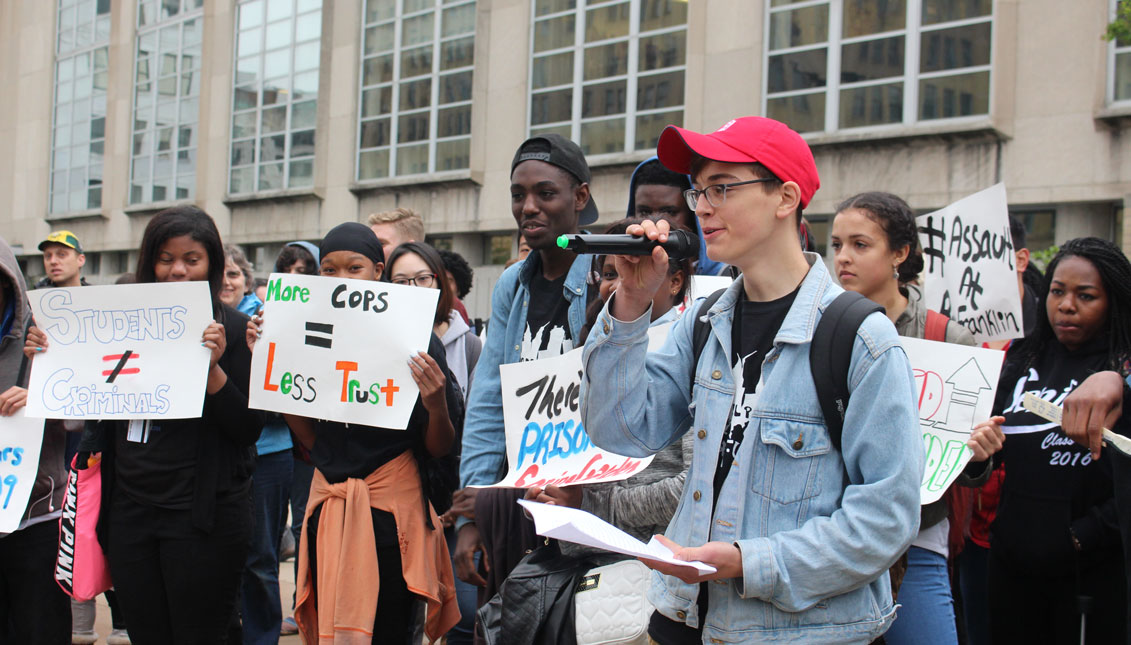
OP-ED: The Great Disciplinary Divide
MORE IN THIS SECTION
The recent episode of a student being assaulted by a school police officer at Benjamin Franklin High School is yet another reminder of the huge obstacles for many young Philadelphians to get a quality education.
A young man was assaulted by the officer for getting frustrated after trying to go to the bathroom. While that incident is still under investigation, it points to chronic problems in our public school system.
The Philadelphia School District has issues rooted in vast disparities of funding, which reflect the even deeper disparities of wealth, economic opportunity, and privilege in our society. These issues show up in our classrooms, and impact the way we are treated by school administrators, faculty, and school police officers.
The Philadelphia Student Union (PSU) is a student-led organization that has been working to build a more just school system for over 20 years. In 2009, PSU and our allies fought to reduce the number of infractions in the student code of conduct that automatically carried a penalty of suspension. At the same time, we called for the introduction of restorative practices as an alternative to punitive forms of discipline.
We were able to reduce by half the number of suspendable infractions (such as dress code and phone usage), and a restorative justice program was implemented. This was an important victory for students, because our ability to graduate is directly connected to the number of disciplinary infractions on our records.
Since that time, our gains have been rolled back. District Superintendent Dr. Hite, reversed this victory, increasing the number of minor offenses that automatically lead to suspension. Also, during his four-year tenure, he has made little to no investment in restorative practices.
The problems regarding excessive penalties for minor infractions and the lack of alternatives are not the only problems with the discipline code used by the Philadelphia School District. There is also the gross disparity in how school discipline is enforced at different schools.
Within the district there are certain schools that have garnered a reputation as “good” schools while others are considered “bad” schools (which then leads to labels of “good” students and “bad” students).
At “good schools” (such as Masterman or Science Leadership Academy), there is very little police presence, students feel welcome and respected, and education is the highest priority. Students at these schools are far from perfect; there are fights in the hallways, students damage school property, and there are even fires in the bathroom. Yet, a student implicated in such trouble would more likely be addressed by faculty, and a process would be worked out to
determine appropriate steps and consequences, including impact on the broader school community – which are elements of a restorative justice approach.
Meanwhile, at a “bad” school (it must be noted that these schools are overwhelmingly African-American and non-white), students are profiled and criminalized. Instead of investing in counselors, restorative practices, and engaging learning opportunities, the district invests in more policing. The very presence of police officers in the schools sends a profoundly negative message to all the students and creates a prison-like atmosphere.
While officers are supposed to be there to ensure safety, the reality is that most students in these schools experience a sense of harassment and threat: If you say the wrong words to an officer you will be suspended. If an officer thinks you are up to no good, you will be suspended. And, as the episode at Benjamin Franklin High reminded us that if the officer feels as though it is needed, we can be assaulted.
Over-policing makes students feel more stressed, even to the point that some students avoid going to school out of fear. When our schools treat us more like criminals than students, actual learning is far more difficult; in turn, students who do graduate often feel unprepared for their futures.
There are many disparities in the school system, some are harder to address than others, but the problem of poorly trained, unqualified, and abusive police is one that we can solve.
The disparities in discipline can and must be addressed by the district. We need the district to create a way for us to officially report police abuse in our schools. We need every officer working in our schools without the proper background checks to be suspended. We need officers, like Officer Maciocha, who have physically assaulted students to be fired. And every officer who remains in our schools to be retrained. We need a discipline approach that moves away from being strictly punitive to one rooted in restorative practices. And, as part of breaking down the destructive myth of “good” versus “bad” students and schools, that disciplinary approach must be equal and uniform throughout the entire district.
All students deserve to be treated with dignity. We demand to be treated with dignity. The district should be focused on ways to divest from school policing and invest in our education. If the district does that, it will not only improve our future prospects, it will create possibilities for a better future for the entire city of Philadelphia.
Naseem Gibson is a junior at Benjamin Franklin High School. Luke Risher is a junior at Science Leadership Academy. Both are members of Philadelphia Student Union.




LEAVE A COMMENT: